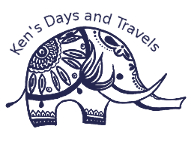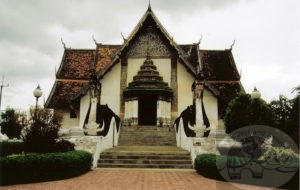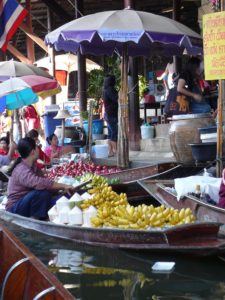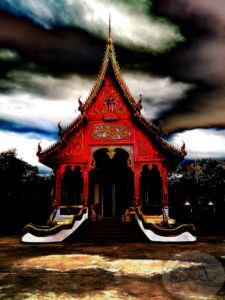Do you like Thailand?
I have mentioned various questions before this, and there are plenty more, but there are also a whole slew of other questions that I won’t necessarily discuss, I will let them speak for themselves as comment would be superfluous, and they are not necessarily part of the core 20 questions you will be asked.
One of the questions you are sure to be asked within your first day or week in Thailand, however, is: Do You Like Thailand?
What are you going to say? I mean, you’re here on holidays or you’re here to work and you’ve got another two years to go.
“No, I absolutely hate it, it’s too hot, it’s too dirty, people ask too many questions, and the beer’s got ice cubes in it”, isn’t going to do it.
As I am writing this entry, I am sitting at a table, thinking of how I would now answer that question. Much has changed in 30 years. When asked the question after a few months in the country, I proclaimed that all was well with the world, and that the country was a true paradise on earth. What else could I possibly want? I had spent a day and night in what was probably one of the most raucous capitals in the world at that time, then been whisked off for an entire month of beach-side bliss. I had started working in a place that was beautiful, met some great people, and made some life-long friends. Obviously I hadn’t had a chance to learn a lot, and I definitely didn’t know about the politics, or the economics, or the corruption, and a whole bunch of other things. I suppose that for most new comers, the best way out of the question is to remain somewhat reserved instead of gushing out how great and wonderful the country and its people are. The opposite is equally as true; being reserved in any criticism or anything that might be construed as criticism, particularly during these times. It is best to take a neutral stance, and you will be doing the right thing.
A difficult time finding an answer
The more I reread the above sentences of this entry, the more difficulty I have continuing to write and putting the ‘right’ spin on the contents. Over the years, I have learned how to weave in and out of society, how to answer without an answer, or how to read the desired direction of a conversation, and often enough I have decided to turn my attention elsewhere when conversations were going somewhere I did not want to go.
There was a time when taxi drivers would talk about how great life in the countryside was and how much more peaceful and healthy. They were looking forward to earning enough to send their kids to school and then eventually to return home and work the land. People living in rural areas seemed more content, as they enjoyed the fruits of their labours, and life in general was less rushed, less oppressive, less consumer-focused. That was in the early 1990s. Something changed. Rampant development of the capital, widespread industrialization, mega projects; yet they never benefited the majority of the population, only certain sectors of society were enjoying the windfall of sky-rocketing property prices, percentages of government budgets, and the ‘wild west’ of unregulated growth. Then came the Asian financial crisis. The conversations in taxis changed, and the mood became more sombre, with more complaints about the situation. A new generation grew up in a time of commercialization, commodification and consumerism; an era in which electronic gadgetry and connectivity became the norm. Scant attention was paid to its effects, while at the same time there was still a blind persistence by those of two or three generations earlier in trying to maintain outdated customs and practices and an education system that, at its best, produced graduates unable to analyze, question, investigate, or so much as dare ask questions. We all know the history after that, from the early part of this century to the present, and so I have this difficulty with answering the question posed at the beginning of this entry.
The Answer in a Coffee Shop
Actually, let me rephrase that, and give perhaps a more complete answer. You see, as I was sitting in a coffee shop in Vientiane, the capital of the Lao PDR, writing the remainder of this chapter, I had an experience that allows me to finish the previous paragraph in a more satisfactory manner. I asked myself what had changed – definitely the attitudes and the economy, and the people. Perhaps in the countryside with people of an older generation I will be proven wrong, but in this instance, I suddenly realized what it was that has changed. As I was sitting, writing, a group of people entered the coffee shop. The table next to mine was occupied by approximately 10 people, and by their conversation, I could hear that the visitors were from the country south of Laos, a country that I had called home for more than 30 years. As more and more people crowded around the table, a mobile phone appeared and started hovering with the purpose of taking a group selfie of the people at the next table. Normal. Yet it wasn’t. The distance was somehow not enough, and slowly the phone came closer and closer to me and suddenly was shoved un-mindfully between my face and my computer screen without so much as a word of apology. I looked up, but there was no reaction, only the smug faces of the selfie-taker and the group at the table.
That is what has changed.
It seems as though there is no longer any respect for the rights of others; any concern for the consequences of actions. There is an overwhelming “me, mine, I” mentality that has replaced what used to be an attitude of generosity, social and cultural decency and a certain level of public dignity. Now it is all about getting that ‘selfie’ that ‘look at me’ moment without any regard for others. I am not lamenting a ‘rose coloured’ past, trust me, there are plenty of other areas that I can comment on, but this truly is an area in which things have changed, and much for the worse. Yes, I can hear the chorus now: “you’re an outsider, who are you to comment on their culture!” or “Many other countries have undergone equally as drastic changes, why don’t you start with your own country, Canada?” To all those comments I say “Perhaps, you are right, but don’t forget, I called this country my home for more than 30 years.” I have seen and learned and lived through these changes; I am not just a ‘short-time’ visitor who swoops in for a four-week visit and then proclaims to know all there is to know. This is not a ‘me and them’, but instead, an ‘us’ moment, and a comment on the changes I observe. The frustrating thing, however, is that I have spent more years living in the country than many of my questioners, or those who would pour scorn on me for making the comments I have, yet still have to deal with the comment “Oh, you’re just a foreigner, you wouldn’t understand.”




